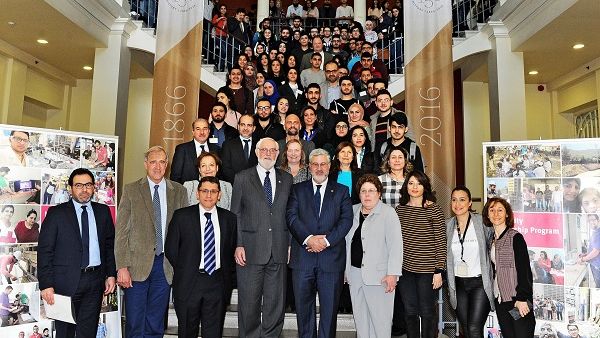USAID’s USP Scholars at AUB Showcase Their Community Service Projects

The American University of Beirut (AUB) and the United States Agency for International Development (USAID) brought together students of the USAID-funded University Scholarship Program (USP) to showcase their community service projects. The event, which took place in Bathish Auditorium, West Hall, AUB, was attended by USAID Counselor Thomas Staal, Acting Deputy Assistant Administrator for the Middle East bureau Jeanne Pryor, USAID Mission Director Dr. Anne Patterson, AUB President Dr. Fadlo R. Khuri, Provost Dr. Mohamed Harajli, Director of USAID-USP at AUB Dr. Malek Tabbal, in addition to AUB faculty, students and staff members.
As part of USAID's full four-year scholarships, USP scholars participate in volunteering activities, non-professional internships and community service projects, implemented in coordination with the Center for Civic Engagement and Community Service (CCECS) at AUB. They are equipped with the tools and skills they need to be active citizens of change.
Dr. Tabbal welcomed the attendees saying, “The academic performance of our USP students has been second to none and it is only matched by their achievements in their community service work.”
Then, President Khuri addressed the students, “It is worth stressing that USP does not just benefit the students from underrepresented communities who can attend an elite educational institution like this one. Rather USP benefits the university itself by making our student body more inclusive, more diverse, and more, yes, ambitious. It helps us at AUB become more inquisitive and more understanding and accepting of the world as we know it today. What better way to present an alternative narrative to some of the prevailing political tragedies around us here? And what better place to do so than Beirut, the capital of Lebanon, one of the most ethnically, religiously, and socioeconomically diverse—and complex—societies on Earth? This program takes that stand— it is a program that enhances inclusivity, opportunity, tolerance, and equity—and we salute the vision of the American people for making it happen.”
Five teams of USP scholars presented their community service projects in which they identified themes and designed interventions in response to the pressing needs of different targeted communities in Lebanon. The projects were “Ehmej Cultural Trail” to promote the local economy, currently being implemented in the Mount Lebanon area; “Promoting Environmental Sustainability” in Jib Janine, West Bekaa, which was completed in 2017; “Road Safety Awareness for Youth” which was also completed in 2017 in the Matn and Keserwan Districts; “Waste Management” in Aidamoun which was completed in 2016 in North Lebanon; and “Economic Empowerment for Underprivileged Women” in Batloun.
In his remarks, USAID Counselor Thomas Staal stated, “Since 2010, we have invested about 99 million dollars in scholarships for 891 students here at AUB in the scholarship program.” He then addressed the scholars saying, “You are the leaders, the investors, the academics, and scientists of the future. For the future is built by civic minded people like we have just heard, who collaborate on a shared future in service to the public interest. And this is the core of the purpose of this university scholarship program, to not only prepare students for the academic achievement that you’re doing here at the university, but also to build life skills, so that students can take the future into their own hands - as you’ve seen, as many of you are already doing - and contribute to Lebanon and to your communities.”
The event concluded with a group photo and a tour of the scholars’ posters showcasing their community service projects in the West Hall Common Room.
Background Information
American University of Beirut
Founded in 1866, the American University of Beirut is a teaching-centered research university based on the American liberal arts model of higher education. AUB has over 9,000 students and over 1,200 instructional faculty members. The University encourages freedom of thought and expression and seeks to graduate men and women committed to creative and critical thinking, lifelong learning, personal integrity, civic responsibility, and leadership.






